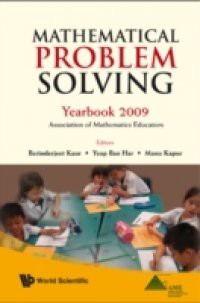This book is the first in the series of the yearbooks of the Association of Mathematics Educators in Singapore. It is highly unique as it addresses a focused theme of mathematics education. The chapters of the book illustrate the immense diversity within the theme and presents research that translates into classroom pedagogies.The chapters of the book illustrate how mathematical problems may be crafted and infused in classroom teaching. Several novel pedagogies, such as learning mathematics through productive failure, problem posing and generative activities are presented in the book. The chapters are comprehensive and laden with evidence-based examples for both mathematics educators and classroom teachers of mathematics. The book is an invaluable contribution towards the already established field of research of mathematical problem solving. It is also a must read for graduate research students and mathematics educators.Contents:Introduction:Mathematical Problem Solving in Singapore Schools (B Kaur & B H Yeap)The Processes and Pedagogies:Tasks and Pedagogies that Facilitate Mathematical Problem Solving (P Sullivan et al.)Learning Through Productive Failure in Mathematical Problem Solving (M Kapur)Note Taking as Deliberative Pedagogy: Scaffolding Problem Solving Learning (L R Albert et al.)Japanese Approach to Teaching Mathematics via Problem Solving (Y Shimizu)Mathematical Problem Posing in Singapore Primary Schools (B H Yeap)Solving Mathematical Problems by Investigation (B W J Yeo & B H Yeap)Generative Activities in Singapore (GenSing): Pedagogy and Practice in Mathematics Classrooms (S M Davies)Mathematical Modelling and Real Life Problem Solving (K C Ang)Mathematical Problems and Tasks:Using Innovation Techniques to Generate “New” Problems (C P Vistro-Yu)Mathematical Problems for the Secondary Classroom (J Dindyal)Integrating Open-Ended Problems in the Lower Secondary Mathematics Lesson (K K J Yeo)Arousing Students' Curiosity and Mathematical Problem Solving (T L Toh) Future Directions:Moving Beyond the Pedagogy of Mathematics: Foregrounding Epistemological Concerns (M Kapur)Readership: Mathematics educators, research students and mathematics teachers.

